The Black natural hair community has amassed a level of power that is being used to directly impact current issues in the Black community. We’ve had a number of victories and I get the feeling that we’re only getting started.
Black naturals (and yes, I say “Black” naturals because those of you who remember Sarah will know that the term “natural” doesn’t always mean “Black”) have played key roles in everything from:
- Drafting the legislation that authorizes natural hair care licenses;
- Creating positive spaces for Black women to support & uplift each other;
- Getting schools in multiple states (like Oklahoma and Ohio to name a few) to stop discriminating against Black girls for wearing their hair in Black girl hairstyles;
- Forcing the military to revise its racist anti-Black hair policies;
- Prompting a massive reduction in sales of perms and relaxers; and
- Harnessing the collective socio-political power of the Black natural hair community through campaigns like Naturals4Change.
These are just a few of the key and significant ways that Black naturals are using our collective power to shift the conversation on issues that impact the broader Black community.
But where do we go from here?
As Black naturals, we’ve chosen to embrace how our Black hair & skin look, feel and grow. This is despite the fact that we live in a society where the economic and governing systems are still based on Blackness being the bottom rung of society.
There’s a power that comes when oppressed people band together and refuse to believe the lies that support their oppression.
Regardless of why you went natural (could’ve had a back to Africa moment or just a bad perm…whatevs), it’s important to know that going through the process of learning to love Black hair can be a truly liberating and (more importantly) empowering time.
How we use that power is up to us.
This past week I was honored to participate in a panel discussion called Afros & Activism, moderated by Natasha Gaspard, the gorgeous & brilliant brains behind ManeMovesTv & founder of the Naturals4Change campaign. Naturals4Change is an “organization comprised of members of the Natural Hair Community advocating for social justice issues.”
When asked why she started the campaign, Gaspard stated:
After feeling the disappointment of the decision to not indict Darren Wilson in the shooting death of Mike Brown, the non-indictment of Officer Pantaleo in the death of Eric Garner and the many blatant killings of Black men and women at the hands of the police happening across the country, I posted a question on Instagram asking the natural hair community a simple question: “What can WE do?” I asked them what are we going to do to ensure our freedom for this and the next generation. I asked for real solutions that can affect REAL change. I received a ton of responses with all kinds of ideas to that simple question. It was as if people were waiting for this discussion to happen within the community. I know the natural hair community has the capacity to make a real impact because we already have. Look at what the natural hair community has accomplished online already. We’re changing the conversation around Black beauty, wellness and lifestyle! I wanted to know how we can harness that power into changing the very system that continues to marginalize Black people.
The Afros & Activism panel focused on a few key areas for Black naturals:
1. An exploration of the similarities & difference in the natural hair movement of the 60’s & 70’s & today;
2. The Afro as a symbol of Black Pride & resistance;
3. The politics of natural hair; and
4. Activism: The natural hair movement as a platform for activism.
Panelists included: Imani Dawson founder of Tribe Called Curl, Arielle Newton founder of Black Millennials; Tahj Sutton, founder of LocLoveLivesHere and Phyllis Bynum, former educator and decades long member of the Black natural hair community. These were dynamic women and I encourage you to visit their social media pages and get connected.
The video for the panel is included below and I’d love to hear your thoughts. How can Black naturals use our collective power? What role should we play in the current issues plaguing the broader Black community? What goals should we be working towards collectively?
********
Looking for more thoughts from an Afro State of Mind? Check out my book Afro State of Mind: Memories of a Nappy Headed Black Girl now available on Amazon.com in paper back or available here for e-book download! And if you want to stay connected follow me on Twitter, or Instagram “like” Afro State of Mind on Facebook or catch up on my latest Youtube videos!
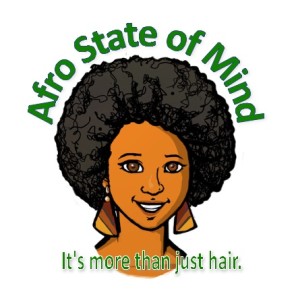
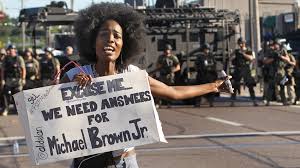

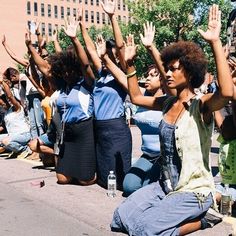
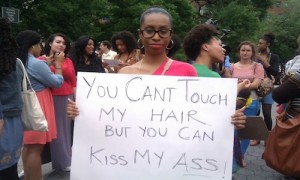

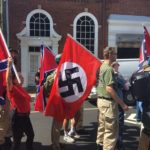
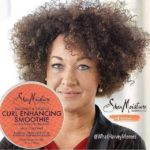
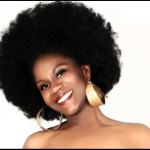
as always, Lurie, i love your posts and the self-reflection each of them promotes. i typically don’t comment bc my only contribution would be “Amen, Sister.” this post tho struck a chord, discord. few comments/questions:
(1) i wonder if the assumption is true that having “natural” hair somehow correlates with socio-politico consciousness. some of the bougie-est, most ignorant, internally racist women i’ve ever met rock fros and locs. so, at least for them, their hair is a fashion not political statement. and vice versa — some of the most bout it, down to earth, for the people women i know sport relaxers, blowouts, keratin treatments and the like. does it matter?
(2) many “naturals” color their hair…with…chemicals (not henna or lemon juice). is that better than sewing in blond/red/blue tracks? does it matter?
(3) i wear my hair straight most of the time these days tho i rocked a short fro, huge bush, cornrows and the like over the years. i am raising a freedom fighter/critical thinker whose hair i choose to keep in twists. i see no contradiction. my natural hair is less kinky, curled looser than some others. it can be blow dryed straight without the use of chemicals. my “fro” looks nothing like Angela Davis’ gorgeous mane. does it matter?
(4) are there potential “divide and conquer” effects, however unintended, of the natural vs. processed hair juxtaposition among Black women? i totally see how hairstyles and hair politics may be relevant & significant in White environments. but among ourselves? in our creation of safe spaces? does hair matter?
(5) is authentic Black pride really about fros, twists, and locs? or does Black pride necessarily entail embracing all facets of Blackness — weaves, extensions, finger waves etc.”? i appreciate the creativity/talent coming out of “natural” Black hair salons as much as i do the creativity/talent of the weave artists. is there room for all of us in the Afros & Activism movement?
finally, what say you of this often unspoken angle of of hair politics: “stay out of my scalp. it’s 2015 and i am FREE to choose whatever hairstyle i like. i’m not a new slave just bc i sport a bob. you’re not a Panther just bc you sport a fro. get over yourselves and stop being so judgmental.”????
i know i don’t have to mince words in this forum, safe space that it is. and i know you, Lurie, know the spirit underlying this message. LOVE.
Sis, thank you so much for your comments – thought provoking indeed! I thought long and hard about answering them in a comment but I think your questions deserve their own post. Give me a minute – I’m going to put this one in my mental assembly line. Thanks for giving me more to write about – I’m always looking for food for thought…I look forward to your response to the upcoming article! 😉